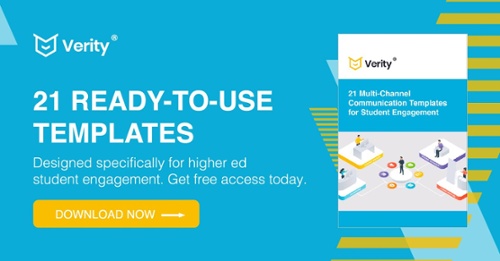The Importance of CRM in Higher Education
Have you ever had a student in your office and you’re trying to pull up a record but you can’t quickly find what you’re looking for?
Does everything, from sending emails to organizing events to updating financial records, take longer than it should?
Most Higher Ed professionals are all too familiar with these scenarios. When you don’t have the right software systems in place, you create less-than-ideal student experiences and a staff that isn’t operating at its maximum efficiency.
So, how can colleges manage their student relationships quickly and effectively? The answer is simple: a high-quality CRM system. With a CRM system, an institution can stay organized and keep student data accessible, from the first day of class to the day they become alumni.
The benefits of CRM in Higher Education are substantial:
- Help streamline the admissions process
- Improve interactions with current and prospective students
- Better insights into the different stages of the student journey
- Empower schools to manage their financials more effectively
Let’s look at how a well-designed CRM can make your institution run more smoothly.
What is Customer Relationship Management in Higher Education?
A CRM (customer relationship management) system is software that manages communication and data sharing between team members. This is particularly important for companies that store a lot of data (like a university with thousands of students), as it streamlines workflow and makes data more accessible to the people who need it.
In a higher education setting, CRM can easily organize students’ information and make it easy to look up through the software. This makes it easier to answer students’ questions and manage other aspects of the student-university relationship (for example, sending out alumni newsletters after graduation). In this way, quality CRM software can become indispensable to a college or university.
Higher Ed Admissions Software
The average student applies to four or five colleges each year, which results in millions of applications across all schools and universities. Reviewing each of these applications can be a massive undertaking, and it becomes even greater when there isn’t an effective system in place. CRM software for colleges and universities makes it easier to manage their application process, helping them land quality applicants with an easier, streamlined system.
CRM systems easily organize student data from the moment their first application arrives until the day they enroll and beyond. Keeping this data in one easy-to-find place makes reviewing applications and managing the student lifecycle much simpler, saving time and effort on the part of the admissions team.
Additionally, CRMs can help higher education administrators market to prospective students by tracking social media and website use among quality candidates. In this way, universities can make their marketing methods more effective while targeting students with whom they want to build a relationship.
Read: What is the Best CRM Software for College and University Admissions?
How CRM Helps the Financial Department
CRM may stand for customer relationship management, but it also yields significant benefits for the user — in this case, the university. Higher learning institutions require funding to stay afloat. This can include grants and state funding, but it also largely hinges on tuition payments and alumni donations. Dealing with this much money can be incredibly difficult, but an effective CRM system will help your financial department manage its billing quickly and easily.
Most CRM systems can track payments and fee collections. Through this system, you’ll be able to see which students owe the institution and whose payments have been paid in full. All information will be secure and carefully stored to protect your students’ identities while still allowing you to be able to look up data and collect payments effectively.

And your relationship with your students does not end after graduation day. Most institutions keep in touch with their alumni through newsletters, magazines, and other correspondence, in the hopes that the alumni and the institution can benefit from one another. Your CRM system should help you keep track of your alumni and give you the data you need to maintain that relationship — after all, satisfied alumni often provide their alma mater with much-needed donations.
How CRM Improves the Student Experience
Finally, it’s no secret that the most important part of any CRM system is the way it benefits the student experience. Students are the lifeblood of any higher education institution, and therefore administration must-have tools to help these young people at their disposal.
One of the most important elements of any CRM system is the way that it manages the student life cycle. Everything about a student’s experience with the university, from the date of their application to their academic record, should be stored in one easy-to-locate system.
Why It's Time to Re-Think the College Student Experience
If this data is stored in the right Higher Ed software, administration workers will be able to search for it easily — and, therefore, be able to answer students’ questions more easily. Additionally, if a student’s information is easy to find and review, it will be easy for teachers and counselors to provide the students with quality guidance and assistance to help them through their academic journey.
Ultimately, a quality CRM system provides better customer service to the people who need it most: the students looking to improve their lives through higher education. If an institution wants to give its students the best possible education they can receive, it needs to have an effective CRM system on its side.
Want to learn more about what a CRM can do for your school? Check out Verity Dialog and learn why so many Higher Ed professionals are getting on board. You can also check out the link below to download our Communication Templates for every step of the student journey!



